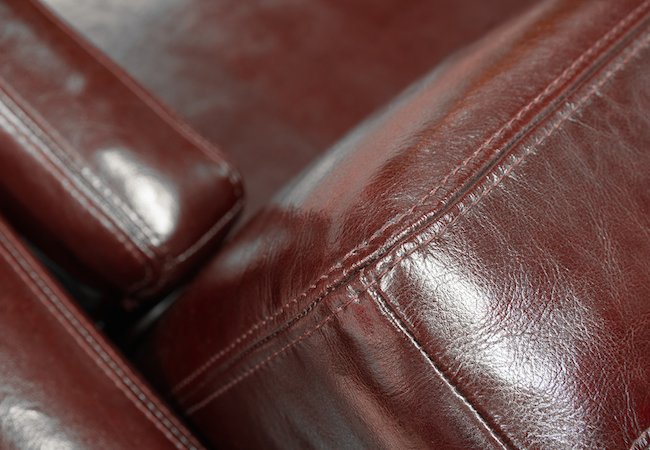We may earn revenue from the products available on this page and participate in affiliate programs. Learn More ›
When the skin of our hands gets dry and starts to crack a bit, we quickly reach for moisturizing lotion. The same logic applies to leather furniture care: Under conditions of low humidity, leather naturally deteriorates—unless you intervene to protect the material with leather conditioner. In addition to regularly cleaning your leather sofa or armchair, proper care calls for treating leather with conditioner to keep it soft and supple over the long haul. There are, of course, many leather conditioners on the market, but you can make your own with nothing more than a few common pantry staples.
PROJECT SUMMARY
Three homemade leather conditioner recipes stand apart from the rest in terms of effectiveness and popularity, and each of relies on a different main ingredient:
- Natural baby soap
- Beeswax
- Lemon essential oil
Read on for more information on each type of homemade leather conditioner, and remember: As with any leather care treatment, it’s important to test your conditioner in an inconspicuous spot before you commit to using it on the entire piece of furniture. Only proceed if you’re happy with the results of the conditioner in the test area.
METHOD 1: Natural Baby Soap
When it comes to homemade leather conditioner, most soaps are poor choices. Natural baby soap is an exception. Just be sure to choose one that includes no potential stain-causing color additives. You can’t go wrong with Johnson’s, which you can get from Amazon or pick up at any drug store or grocery store.
To make and apply baby soap-based leather conditioner:
- Mix one quart of warm water, one tablespoon of soap, and a couple drops of vinegar.
- Dip a cloth into the mixture, wringing it out so it’s damp and not wet.
- Wipe down the entire surface of the leather furniture piece.
- Allow the leather to air-dry once finished.

METHOD 2: Beeswax
An alternative to a liquid solution, beeswax-based leather conditioner works great but requires more preparation. To make and apply it:
- Combine beeswax, cocoa butter, and sweet almond oil in a saucepan, using a 1-1-2 ratio.
- Apply medium heat, being very careful not to overheat.
- As soon as the solid fats have melted into the oil, remove the pan and allow the mixture to cool. After 30 or 40 minutes, you should have a thick balm.
- Apply the balm directly to the leather with your fingers, gently massaging in the conditioner, wiping away any excess.
- Once finished, buff the leather with a dry cloth to make it shine.
Note: Be sure to use only 100% pure beeswax. Check your local health food store or order online. It’s less expensive than you might think, and it’s wonderfully handy for dozens of small jobs around the house (lubricating “sticky” dresser drawers, for instance).
METHOD 3: Lemon Essential Oil
Oil-based conditioners are a controversial topic in leather care. While many homemade leather conditioner recipes involve the combination of olive oil and vinegar, some experts warn that olive oil can damage leather over time.
What do those experts recommend instead? Lemon essential oil (available on Amazon). It’s comparatively safer to use, but it still offers the conditioning qualities you want for the task at hand.
To use lemon essential oil as a leather conditioner, dampen a soft, clean cloth with 10 to 15 drops of lemon essential oil, then massage the leather surface with the cloth. Not only does the oil leave behind a fresh scent, but it also works to prevents cracks and promote the longevity of the leather piece.


